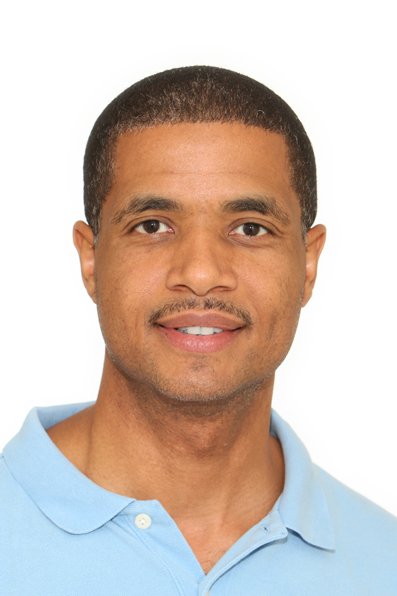Meet EPA Researcher Carlton Jones

What research are you doing at EPA?
My research includes projects on chemical safety for sustainability and safe & sustainable water resources. In safe and sustainable water resources, I am working on per-and polyfluoroalkyl substances (PFAS), which are a group of human made chemicals found everywhere (plants, animals, humans). I am involved in research specifically looking at PFAS chemicals in drinking water. My work in chemical exposures (PFAS/PFOS) is instrumental in determining and identifying biomarkers for diseases, such as cancer.
Tell us about your background.
I am a native of Silver Spring, Maryland, and my background is in molecular biology. I earned a Bachelor of Science degree in laboratory animal science from North Carolina Agricultural and Technical State University, a Master of Science degree in animal science with a concentration in molecular genetics from Tuskegee University, and Master of Science in animal science with a concentration in molecular virology from Michigan State University. I am a member of Alpha Phi Alpha Fraternity and an Eagle Scout who currently serves as a scout leader. I live with my family in the RTP, NC area.
When did you first know you wanted to be a scientist?
I knew I wanted to be a scientist at a young age. I used to collect insects and small reptiles such as turtles. My parents forbid me from having snakes in the house but I had a terrarium that kept me forever exploring and learning. My favorite hobby was looking at various creatures under my microscope. My love of science has remained into adulthood.
How does your science matter?
My research aids in determining whether a chemical found in the environment has an adverse effect on human health.
If you could have dinner with any scientist, past or present, who would it be? What would you ask?
Dr. Percy Julian, a Black chemist who pioneered the synthetization of drugs from plants. He was also a tremendous orator. I chose him because he persevered through racism and barriers to earn his Ph.D. and lead is his field. I would ask him what drove him throughout his career and how would the lessons he learned help us today?
If you weren’t a scientist, what would you be doing?
Probably pursuing a career in music. I played several instruments growing up. My brother was really into music and introduced me to different genres of music and a plethora of instruments.
If you could have one superpower, what would it be and why?
To foresee the future so I could predict and aid in creating positive outcomes for people.
Any advice for students considering a career in science?
Figure out what you are most passionate about and stay focused on that. Be unafraid to dig deep into the STEM subjects (science, technology, engineering, and math), and reach out to scientists to learn about their experiences and journey.
What do you think the coolest scientific discovery was and why?
The computer, it is used every day in science. We use computers to operate instruments in the laboratory, collect data, and compute that data so it can be interpreted for the benefit of expanding the scientific field.
What do you think is our biggest scientific challenge in the next 20/50/100 years?
Within the next 20 years: Water insecurity. Because of climate change, fewer usable water sources will be available.
50 years: Finding an energy alternative to fossil fuels that does not rely on combustion. We will need a find a fuel source that is not commonly being discussed at this time.
100 years: Interplanetary travel, with the challenge of finding a way to travel from solar system to solar system.
Editor's Note: The opinions expressed herein are those of the researcher alone. EPA does not endorse the opinions or positions expressed.
